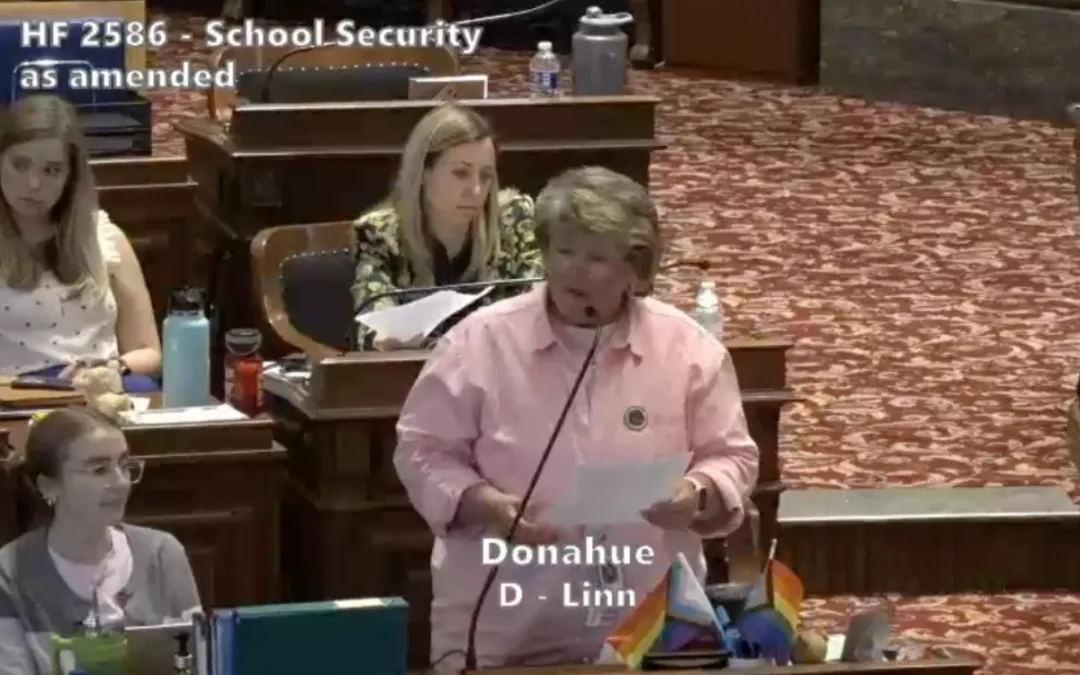The voter registration of Iowa Senate Majority Leader Jack Whitver (R-Ankeny/Grimes) is formally being challenged and a hearing will take place at 2 p.m. on Nov. 30 at the Polk County Election Office in Des Moines. The dispute stems from evidence showing Whitver very likely does not live at his Grimes apartment, which is in the Iowa Senate district he ran for this year.
Polk County Auditor Jamie Fitzgerald notified Whitver in a Nov. 10 letter that his registration was challenged by county voter Ann Gale.
According to Iowa Code, Gale and Whitver, or their respective representatives, will each present evidence during the hearing, and in his capacity as election commission, Fitzgerald will decide whether to reject the challenge or to cancel Whitver’s voter registration. No matter the outcome, either side has an opportunity to appeal to the district court.
Fitzgerald’s letter also includes evidence of why Gale does not believe Whitver lives in the residence where he is registered to vote and is listed as his primary residence on a candidate affidavit filed with the Iowa Secretary of State’s general election candidate list.
Whitver was the longtime senator for the Ankeny-centered senate district, but “moved” to an apartment in Grimes to run for the Senate District 23 seat after redistricting, which included a portion of his former district.
Rep. Mike Bousselot (R-Ankeny) was successful in his bid to capture Whitver’s former seat during the Nov. 8 election when he defeated Todd Brady (D-Ankeny).
[inline-ad id=”0″]
Whitver’s residency has been in question since an Oct. 26 report by Cedar Rapids TV Station KCRG showed that water usage at Whitver’s Grimes’ apartment—which he and his wife, Rachel, purchased nearly two years before redistricting—has been minimal.
In her challenge, Gale wrote that on Oct. 9 a volunteer for Brady’s campaign knocked on the door of the Whitvers’ Ankeny home and spoke to Rachel Whitver.
During the conversation, Rachel Whitver confirmed she was still living in Ankeny with her family and was registered to vote there, according to a sworn affidavit from the volunteer who spoke to her.
Gale’s challenge also notes that all of Jack and Rachel Whitver’s social media accounts still list Ankeny as their address; three of his business holdings are registered to the Ankeny address, and he is still listed as an Ankeny resident in online biographies posted on websites for the Iowa Senate Republicans and a law firm Whitver works at.
The challenge also included media reports that showed the water bills for the Grimes’ apartment, an excerpt from a KCCI story in which a reporter found packages on the doorstep of the Ankeny home addressed to Jack Whitver while attempting to contact him there.
[inline-ad id=”1″]
The Whitver family is made up of Jack, Rachel, and their three children, and their Ankeny home is four bedrooms and has 2,416 square feet of “living area,” according to Polk County property records. The Grimes’ apartment Jack Whitver claims is his residence is three bedrooms and has 1,208 square feet of living area, which is only slightly bigger than the garage at his Ankeny home.
Whitver’s situation is similar to a January 2020 situation involving Jeremy Taylor of Sioux City, a Woodbury County Supervisor and former Republican congressional candidate.
Taylor’s voter registration was challenged by a constituent who successfully argued that Taylor did not live at the address he was using to maintain his board position. The matter was overseen by Woodbury County Auditor Pat Gill
“There’s a lot of things that you had to consider because residency is a very tricky thing,” Gill said, recalling the Taylor situation. “There’s different types of situations that are in the code that allow you to do that.”
According to Gill, in Iowa, a person can leave their residency for basically any amount of time as long as they state that it’s their clear intention to return there. He also said these types of situations are so rare here there is very little existing case law that sets a precedent.
“So that’s what Jeremy Taylor was banking on, but when it came right down to it, I had to go with my gut feeling as to what the intent of the law was,” Gill said.
“It was pretty evident that he and his family had moved out of the district and that he kept a piece of property that he previously used as rental property, but he kept it vacant and then put his voter registration on it when they moved.”
Gill ruled that Taylor’s voter registration was invalid at the address he listed. Taylor resigned from the board of supervisors; however, he would go on to win a four-year term on the board that fall while running in his actual district.
[inline-ad id=”2″]
According to Derek Muller, a law professor at the University of Iowa, if the challenge to Whitver’s voter registration is successful then the election commissioner—in this case, Polk County Auditor Jamie Fitzgerald—can cancel his voter registration. Again if Whitver’s registration is canceled at the hearing, he could appeal in district court.
“It’s possible that the hearing could indicate that you were ineligible to vote once before and have committed registration fraud under 39A of the Code, but there’s nothing that automatically comes from a canceled voter registration as the result of a challenge,” Muller said.
Muller was also asked what happens if a person wins an elected office using the address of a place they are registered to vote, but it’s later proven that the candidate doesn’t actually live there.
“It depends,” he said. “If it’s for the legislature, the legislature is the judge of the qualifications of its members under the Constitution.”
[inline-ad id=”3″]
In Jack Whitver’s case, as Senate Majority Leader, he would determine whether or not he meets the criteria to be a member of the body. Muller also explained other possible outcomes.
“If it’s another office, someone might file what’s known as a ‘writ quo warranto’ arguing they are actually entitled to the office,” Muller said. “It’s possible you could file a writ for members of the legislature but I’m not as familiar with this.
“Finally, you may have what’s known as a ‘laches” problem, bringing the claim too late. A post-election challenge looks different from a pre-election challenge. There are many contingencies here depending on the case.”
According to the letter Fitzgerald delivered to Jack Whitver, Ann Gale filed her voter registration challenge on Nov. 5—three days before the Nov. 8 election in which Whitver defeated longtime Grimes resident Matt Pries.
In Iowa, if a person provides false information on their voter registration form, they “may be convicted of perjury and fined up to $10,245 and/or jailed up to five years.”
by Ty Rushing
11/17/22
[inline-ad id=”4″]
To contact Senior Editor Ty Rushing for tips or story ideas, email him at [email protected] or find him on Twitter @Rushthewriter
Iowa Starting Line is part of an independent news network and focuses on how state and national decisions impact Iowans’ daily lives. We rely on your financial support to keep our stories free for all to read. You can contribute to us here. Also follow us on Facebook and Twitter.
Politics

Abortion supporters rally before Iowa Supreme Court arguments
Abortion saved her life seven years ago and Leah Vanden Bosch is more grateful for it now than ever. Vanden Bosch, who serves as the development and...

New VA program to help more than 40,000 veterans stay in their homes
The Department of Veterans Affairs (VA) will launch a “last resort” program for tens of thousands of American veterans who are in danger of losing...
Local News

No more Kum & Go? New owner Maverik of Utah retiring famous brand
Will Kum & Go have come and gone by next year? One new report claims that's the plan by the store's new owners. The Iowa-based convenience store...

Here’s a recap of the biggest headlines Iowa celebs made In 2023
For these famous Iowans, 2023 was a year of controversy, career highlights, and full-circle moments. Here’s how 2023 went for the following Iowans:...





